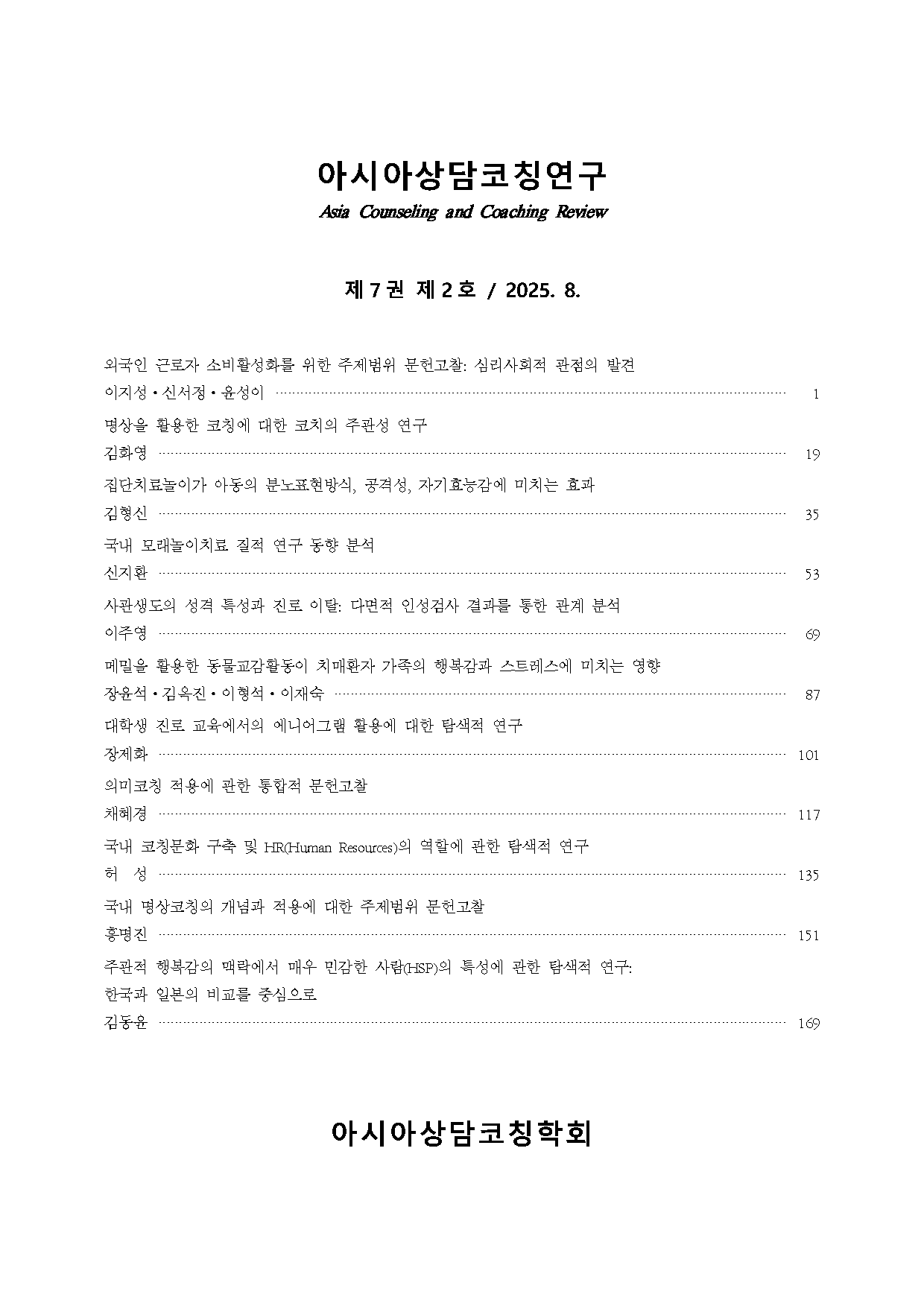명상을 활용한 코칭에 대한 코치의 주관성 연구
Exploring Coaches’ Subjectivity in Applying Meditation to Coaching - A Q-Methodology Approach
- 아시아상담코칭학회
- Asia Counseling and Coaching Review
- 제7권 제2호
-
2025.0819 - 34 (16 pages)
-
DOI : 10.47018/accr.2025.7.2.19
- 24

본 연구는 Q 방법론을 통해 명상을 활용한 코칭에 대한 코치들의 주관적 인식을 유형화하고, 그들이 명상과 코칭의 관계를 어떻게 해석하고 수용하는지를 밝히고자 하였다. 이를 위해 코칭에 명상을 활용하는 데 대한 37개의 진술문을 구성하고, 명상 경험이 있는 코치 30명을 대상으로 Q-software를 통해 Q 분류 작업을 실시하였다. 수집된 자료를 Ken-Q 프로그램을 통해 요인 분석한 결과 네 가지 주된 인식 유형이 도출되었다. 1유형은 ‘본질 중심 성찰형’으로 명상을 ‘코칭과 철학적 지향점이 다르지 않으며, 코칭 전 과정을 이끌어갈 수도 있는 중요한 패러다임’으로, 2유형은 ‘활용중심 도구형’으로 명상을 ‘코칭과는 별개의 영역으로 코칭 과정을 도울 수 있는 실용적인 도구’로 인식하였다. 3유형은 ‘고객중심 조율형’으로 명상을 ‘근거 있는 유용한 접근이지만 코치가 충분한 전문성을 확보하고 고객과의 협의를 반드시 거친 뒤에 활용 가능한 개입 중의 하나’로 인식하였으며 4유형은 ‘코치중심 앵커형’으로 명상을 ‘코치의 자기관리 및 성찰을 강화함으로써 코칭에 도움을 주는 코치의 성장 도구이자 경험적 실천 도구’로서 인식하고 있었다. 각 유형은 코칭 과정에 명상을 수용하는 관점과 태도, 한계점이 다름을 보여주며, 이는 향후 명상 코칭 프로그램의 개발과 교육 실천 전략이 코치의 주관적 인식 유형에 맞춰 차별화될 필요가 있음을 시사한다. 본 연구는 코칭 현장에서 코치들의 주관성을 바탕으로 명상과 코칭의 융합 가능성 및 방향성을 탐색하였다는 점에 있어 이론적․실천적 의의가 있으며, 향후 명상코칭이 실제적으로 시대적 요구에 걸맞은 전문 영역으로 확장되기를 기대한다.
This study aimed to categorize coaches’ subjective perceptions of meditation-based coaching through Q-methodology and to reveal how they interpret and accept the relationship between meditation and coaching. For this purpose, 37 statements regarding the use of meditation in coaching were constructed, and Q-sorting was conducted with 30 coaches who had meditation experience using Q-software. Factor analysis of the collected data through the Ken-Q program revealed four main perception types. Type 1, ‘Essence-centered Reflective Type,’ perceives meditation as ‘an important paradigm that does not differ in philosophical orientation from coaching and can lead the entire coaching process.’ Type 2, ‘Application-centered Tool Type,’ recognizes meditation as ‘a practical tool in a separate domain from coaching that can assist the coaching process.’ Type 3, ‘Client-centered Tuning Type,’ perceives meditation as ‘one of the interventions that can be utilized only after the coach has secured sufficient expertise and must consult with the client, although it is an evidence-based useful approach.’ Type 4, ‘Coach-centered Anchor Type,’ recognizes meditation as ‘a growth tool and experiential practice tool for coaches that helps coaching by strengthening the self-management and reflection of coaches’ Each type shows different perspectives, attitudes, and limitations in accepting meditation in the coaching process, suggesting that future development of meditation coaching programs and educational practice strategies need to be differentiated according to coaches’ subjective perception types. This study has theoretical and practical significance in exploring the possibility and direction of integrating meditation and coaching based on coaches’ subjectivity in the coaching field, and is expected in the future, meditation coaching to expand into a specialized field that more practically meets the needs of the times.
Ⅰ. 서론
Ⅱ. 연구 방법
Ⅲ. 연구 결과
Ⅳ. 논의 및 결론
참고문헌
(0)
(0)